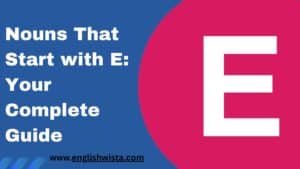When you think about nouns in English, the letter X probably isn’t the first one that comes to mind. In fact, most people find it hard to name even one noun that begins with X. Words starting with A, B, or C feel easy, but X is a rare letter. That’s exactly what makes it fun and interesting to learn about!
In this article, we’ll take a close look at nouns that start with X. Don’t worry if English isn’t your first language, or if grammar feels confusing sometimes. We’ll keep things simple, friendly, and clear. We’ll explore what these words mean, how to use them in sentences, and even share a few fun facts along the way.
By the end, you’ll feel much more confident about recognizing and using nouns that start with X.
What Is a Noun, Again?
Before we dive into the “X” nouns, let’s remind ourselves what a noun is.
- A noun is simply a word that names a person, place, thing, or idea.
- Examples: dog, city, happiness, teacher, river.
So when we talk about nouns that start with X, we’re looking for words that fit this “naming” role.
Why Are Nouns Beginning With X So Rare?
The English alphabet has 26 letters, but some letters are used far more often than others. Letters like S, T, and M appear in thousands of words. On the other hand, letters like X, Q, and Z are much rarer.
One reason X nouns are uncommon is because English borrowed many of them from other languages, like Greek, Latin, or French. That’s why some of them might sound unusual or look complicated at first glance.
Common Nouns That Start With X
Let’s explore some of the most common nouns that begin with X. Don’t worry we’ll explain them in plain language and give you examples.
Xylophone
- Definition: A musical instrument made of wooden bars that you hit with sticks to produce sound.
- Example Sentence: The child played a cheerful song on the xylophone.
- This is probably the most well-known X noun. If you’ve ever seen a toy with colorful wooden bars, that’s a mini xylophone!
X-ray
- Definition: A type of invisible ray that doctors use to look inside your body.
- Example Sentence: The doctor checked my arm with an X-ray to see if it was broken.
- Even though it’s written with a capital X, it’s still a noun when we talk about “an X-ray.”
Xenon
- Definition: A chemical element (a type of gas) used in lights and lamps.
- Example Sentence: The streetlights were filled with xenon gas.
- This noun comes from science, so you’ll see it in chemistry or physics.
Xerox
- Definition: A photocopy, or the machine that makes copies. (It comes from the brand name Xerox.)
- Example Sentence: She made a Xerox of the report before submitting it.
- Sometimes, brand names become common nouns. Xerox is one of those cases.
Xylograph
- Definition: A print made from an engraving on wood.
- Example Sentence: The museum displayed an old xylograph of a forest scene.
- This word comes from art and history. It’s not very common, but it’s interesting!
Less Common Nouns That Start With X
Here are some nouns you may not hear often, but they still exist in English.
- Xenophobia – fear or dislike of foreigners or strangers. (Noun form of a negative idea.)
Example: His xenophobia stopped him from traveling abroad. - Xerophyte – a plant that can survive with very little water.
Example: The cactus is a type of xerophyte. - Xylology – the study of wood.
Example: He studied xylology to understand tree growth better. - Xyst – an ancient covered walkway, especially used in Greek or Roman times.
Example: Tourists walked through the ruins of the xyst.
Even though these aren’t everyday words, they’re helpful if you like science, history, or advanced English vocabulary.
Is “X-ray” Singular or Plural?
Good question! The word X-ray can be both singular and plural, depending on the sentence.
- Singular: The doctor took an X-ray of my chest.
- Plural: The dentist looked at my X-rays.
Notice that the plural form is simply X-rays (just add “s”). Easy, right?
Where Do X Nouns Come From?
Most X nouns have interesting origins:
- Many come from Greek. For example, xylophone combines “xylon” (wood) and “phone” (sound).
- Some come from scientific language, like xenon (Greek for “stranger”).
- Others are borrowed from brand names, like Xerox.
This shows us how English loves to borrow and adapt words from other places.
How to Remember X Nouns Easily
Here’s a simple trick:
Think of X as “ex”. Many X nouns sound like they begin with “ex.”
- X-ray → sounds like “ex-ray.”
- Xylophone → sounds like “zylophone.”
- Xenon → sounds like “ze-non.”
So if you can remember that X often sounds like “z” or “ex,” these words won’t feel so strange anymore.
Real-Life Example Sentences With X Nouns
Let’s practice with a few examples so you can see how these words fit into daily life.
- Children love playing songs on the xylophone in music class.
- The patient was nervous before getting an X-ray at the hospital.
- Scientists discovered that xenon gas can be used in bright lamps.
- He made a Xerox of his passport before traveling abroad.
- The cactus, a xerophyte, can survive in the desert without rain.
Notice how the nouns always name something: an instrument, a medical image, a gas, a copy, or a plant.
Fun Facts About X Nouns
Let’s add a little fun!
- The word xylophone is often one of the first “X” words children learn in school because it’s colorful and musical.
- X-ray was discovered accidentally by Wilhelm Röntgen in 1895, and at first, nobody knew what to call it. He just wrote “X” because it meant “unknown.”
- Xerox became so popular that people use it as a verb too, like “to xerox a paper,” even though the company prefers the word “photocopy.”
- In Scrabble, the letter X is worth 8 points because it’s so rare. Knowing nouns with X can give you an advantage in word games!
A Quick Review: Key X Nouns
Here’s a list you can keep in mind:
- Xylophone (musical instrument)
- X-ray (medical image)
- Xenon (chemical element)
- Xerox (photocopy or machine)
- Xylograph (wood engraving print)
- Xenophobia (fear of strangers)
- Xerophyte (desert plant)
- Xylology (study of wood)
- Xyst (ancient walkway)
Why Should You Learn X Nouns?
You might wonder: Do I really need to know these rare words?
Here’s why they’re useful:
- They make your English vocabulary richer.
- They help you in science, history, or art discussions.
- They give you confidence in word games, spelling bees, or quizzes.
- They’re fun conversation starters most people can’t name more than one or two!
Simple Tips for Practicing With X Nouns
- Write them down in a notebook.
- Say them out loud this helps you remember the unusual sounds.
- Use them in a sentence once a day, even if it feels silly.
- Play games like Scrabble or crossword puzzles with these words.
Conclusion
Nouns that start with X may be rare, but that’s exactly what makes them exciting to learn. From everyday words like X-ray and xylophone to more advanced ones like xerophyte or xylology, these nouns open a small but fascinating window into the English language.
The main takeaway is simple: nouns name people, places, things, or ideas, and yes even the mysterious letter X has its share of them.
So next time someone asks you to name a word starting with X, you’ll have plenty of answers ready. And who knows you might even impress them with an unusual word like xyst or xylograph!
Quick Recap for You:
- Nouns are naming words.
- X nouns are rare but fun.
- Common ones: xylophone, X-ray, xenon, Xerox.
- Advanced ones: xerophyte, xylology, xylograph.
- Use them in sentences to practice and remember.
Now you’re officially an expert on nouns that start with X!



